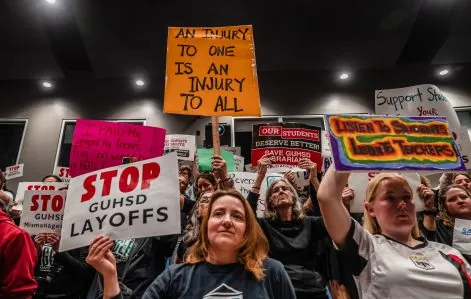Discrimination in the workplace can take many forms, from race and gender to age and disability. However, in today’s politically polarized climate, another type of discrimination is emerging—political party discrimination.
With politics a deeply personal and often divisive topic, employees may find themselves at odds with colleagues or even employers based on their political beliefs.
This raises the question: Is political party discrimination in the workplace real, and what can employees do if they believe they are being targeted for their political affiliations?
Employees need to understand the concept of political party discrimination in the workplace, its prevalence, how it manifests, and what legal protections, if any, are in place.
Unfortunately, employees who may face political discrimination need legal guidance to pursue such a claim. If you believe your employer discriminated against you due to your political beliefs, contact an employment discrimination lawyer to explain your rights and pursue justice.
SCHEDULE A FREE CASE EVALUATION
What is Political Party Discrimination?
Political party discrimination occurs when an employer treats an employee differently or unfairly due to their political beliefs or affiliations.
Discrimination can manifest in various ways, such as the employer denying the employee a promotion, hostile treatment from colleagues, or even termination from a job.
Political party discrimination can affect employees of all political persuasions, from those who align with major political parties to individuals who support independent or third-party candidates.
While political discussions and disagreements are common in many workplaces, they can sometimes lead to more serious issues when individuals face mistreatment based on their political beliefs.
For example, an employee who supports one political party may feel ostracized by colleagues or supervisors who support an opposing party. In extreme cases, this mistreatment may rise to the level of discrimination.
The Prevalence of Political Party Discrimination
Although political party discrimination is not as widely discussed as other forms of workplace discrimination, political debates, social media, and the 24-hour news cycle often bring political disagreements to the workplace.
In a recent survey conducted by the Society for Human Resource Management (SHRM), nearly half of employees (44 percent) reported that they held or witnessed political discussions in the workplace. Of those employees, 42 percent said these discussions had hurt their work environment. Furthermore, the same survey found that 24 percent of employees had experienced political party discrimination in the workplace.
This data suggests that political party discrimination is a real issue many workers face. Yet, according to the same survey, only 8 percent of organizations have communicated guidelines to employees about workplace political discussions.
How Does Political Party Discrimination Manifest?
Political party discrimination can take various forms, from subtle microaggressions to overt acts of mistreatment. Below are some common ways that political party discrimination may manifest in the workplace:
Unequal Treatment in Hiring and Promotions
One of the most common ways political party discrimination manifests is through hiring and promotion decisions. An employer may dislike candidates or employees who hold political beliefs that differ from their own.
For example, an employer supporting a particular political party may not hire or promote someone openly affiliated with an opposing party. This discrimination can lead to employees losing job opportunities or career advancement simply because of their political views.
Hostile Work Environment
A hostile work environment can develop when employees face harassment or ridicule based on political beliefs. This may include derogatory comments, jokes, or exclusion from workplace activities. Employees may sometimes feel uncomfortable or unsafe expressing their political opinions, leading to a toxic work environment.
A hostile work environment can damage employee morale and can cause significant stress and anxiety.
Retaliation
Retaliation is another form of political party discrimination that occurs when employers punish employees for expressing their political beliefs.
For example, an employee who speaks out in favor of a particular political candidate or policy may face retaliation from their employer in the form of reduced hours, demotion, or even termination. Retaliation can also occur if an employee files a complaint about political discrimination and is subsequently treated unfairly by their employer.
Political Affiliation as a Factor in Layoffs
During economic downturns or restructuring, employers may need to make difficult decisions about layoffs. Unfortunately, some employers may use an employee’s political beliefs to determine who to let go.
For example, an employer with strong political affiliations may be likelier to lay off employees with opposing political views.
Political Apparel and Symbols
In some workplaces, employers may target employees for wearing political apparel or displaying symbols associated with their political beliefs. This can include wearing a political party’s logo, buttons, or other insignia.
Employers may enforce policies prohibiting political expressions, but if these policies are applied inconsistently or unfairly, they can lead to discrimination.
For example, an employer may allow employees to wear apparel supporting one political party while prohibiting apparel supporting another.
Legal Protections Against Political Party Discrimination
Unlike other forms of workplace discrimination, such as race, gender, or religion, political party discrimination is not explicitly protected under federal anti-discrimination laws.
However, some states and localities have enacted laws that protect employees based on their political beliefs. Certain constitutional protections may also apply in specific situations, particularly for government employees.

Federal Law
At the federal level, there are no specific laws that prohibit political party discrimination in the workplace. The Civil Rights Act of 1964, the primary federal law prohibiting workplace discrimination, does not include political beliefs as a protected category.
However, there are some situations in which political discrimination can intersect with other protected categories.
For example, if an employer discriminates against an employee for their political beliefs and those beliefs are closely tied to their religion or national origin, they may have grounds for a discrimination claim under federal law.
State and Local Laws
Several states and cities have enacted laws that specifically protect employees from political party discrimination. These laws vary by jurisdiction but generally prohibit employers from making employment decisions based on an employee’s political beliefs or affiliations.
For example, in California, the California Labor Code Section 1101 and 1102 prohibits employers from controlling or directing employees’ political activities or affiliations. Similarly, in New York, the Labor Law Section 201-D protects employees from discrimination based on their political activities outside of work.
Employees in states with political discrimination protections may have stronger legal recourse if they experience discrimination in the workplace. Consult an employment discrimination attorney to determine whether your state has specific laws that apply to your situation.
First Amendment Protections for Government Employees
While private-sector employees generally do not have constitutional protections for political speech in the workplace, government employees may have some First Amendment protections.
The First Amendment protects individuals’ right to free speech, including political speech. For government employees, this means that they may be protected from retaliation or discrimination based on their political beliefs or activities as long as those activities do not interfere with their job duties.
However, the First Amendment’s protections are not absolute. Government employers may still take action against employees if their political speech disrupts the workplace or undermines the employer’s mission.
Additionally, government employees should exercise caution when expressing political opinions in their official capacity, as this can lead to conflicts of interest or violations of ethics rules.
SCHEDULE A FREE CASE EVALUATION
Proving Political Party Discrimination in the Workplace
Employees who believe their employers targeted them for their political beliefs can hire a lawyer to build a strong case. Below are some of the key elements involved in proving political party discrimination:
Gather Evidence
The first step in proving political party discrimination is gathering evidence that supports your claim.
This may include:
- Documentation: Keep records of any discriminatory comments, actions, or decisions that you believe were motivated by your political beliefs. This can include emails, performance reviews, or notes from meetings where political discussions took place.
- Witnesses: If other employees witnessed the discrimination, ask them to provide statements or testify on your behalf. Witnesses can help corroborate your claims and provide additional context.
- Patterns of Behavior: Look for patterns of behavior that suggest political discrimination. For example, if multiple employees with similar political beliefs were laid off or demoted, this can indicate a broader issue of discrimination.
File a Complaint with Your Employer
If you believe someone has discriminated against you for your political beliefs, ask a lawyer about filing a formal complaint with your employer. Many companies have policies prohibiting discrimination, and filing a complaint can help document the issue. Follow your employer’s procedures for reporting discrimination and keep a copy of any written complaints.
Consult with a Reputable Employment Discrimination Lawyer
If your complaint does not resolve or you believe your employer retaliated against you, consult an employment discrimination lawyer.
A reputable employment discrimination lawyer can evaluate your case, gather evidence, and determine whether you have grounds for a legal claim. They can also advise you on the best course of action, whether that involves filing a lawsuit, negotiating a settlement, or pursuing other legal remedies.
How an Employment Discrimination Lawyer Can Help You
An employment discrimination lawyer plays a critical role in advocating for individuals who have faced unfair treatment in the workplace due to their race, gender, age, disability, religion, or even political views or affiliations.
Attorneys focus on understanding complex employment laws and regulations, allowing them to effectively navigate the legal landscape on behalf of their clients.
One primary way an employment discrimination lawyer can help is by providing reliable guidance on the legal process. They can also assist in gathering evidence, such as documentation of discriminatory practices, witness statements, and relevant employment records. This comprehensive approach strengthens the case and increases the likelihood of a favorable outcome.
An employment discrimination lawyer can also represent clients during negotiations with employers or insurance companies, advocating for fair settlements and compensation for damages, including lost wages, emotional distress, and attorney fees.
If a resolution cannot be reached through negotiation, these attorneys are prepared to take the case to court, ensuring their client’s rights are protected throughout the legal proceedings.

Remedies for Political Party Discrimination
If you prove political party discrimination, you may qualify for various remedies, including:
- Reinstatement: If your employer terminated or demoted you due to political discrimination, you may qualify for reinstatement to your previous position or a similar role.
- Back Pay: You may be entitled to compensation for lost wages and benefits resulting from the discrimination.
- Damages: In some cases, employees may recover damages for emotional distress, pain and suffering, or other harm caused by the discrimination.
- Injunctive Relief: A court may issue an injunction requiring the employer to stop the discriminatory practices or take corrective action.
Stand Up Against Political Party Discrimination: Contact a Seasoned Employment Discrimination Lawyer Today
While political party discrimination may not be as widely recognized as other forms of workplace discrimination, it is a real and timely issue that can have significant consequences for employees.
If you believe your employer targeted you for your political beliefs, take action to protect your rights.
An experienced employment discrimination attorney can manage the complicated legal landscape and pursue justice for political party discrimination. A lawyer can help gather evidence, file a complaint, and seek the compensation and remedies you deserve.
Don’t let political bias or discrimination undermine your career—contact an employment discrimination attorney today to discuss your case and learn how you can protect your rights in the workplace.





